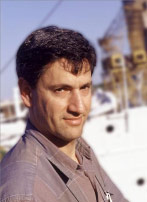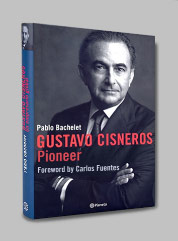Summary - By Pablo Bachalet
This book tells the story of one man’s visionary quest to turn a Venezuelan family business into a multinational entertainment conglomerate. The fast-paced account takes the reader deep into the vertigo of Latin American business, from Cisneros’ frustrated efforts to expand into petrochemicals in the 1970s to his behind-the-scenes cajoling of fellow media barons to give rise to Univision and DirecTV Latin America.
Cisneros is the son of Diego Cisneros, a gutsy self-made Venezuelan business icon who had dethroned the mighty Coca Cola Company with an upstart Pepsi Cola brand. Impressed by the young Cisneros’ insatiable curiosity and drive, one day Diego took his son to one side and told him: “I will teach you to become a leader of men.”
Diego thrust his eager son deep into the engine rooms of his soft drink bottling and TV empire. As he completed his studies in Venezuela and the United States, Gustavo Cisneros developed a fondness for Venevision, the national TV station that his father had catapulted to the top of Venezuela’s ratings. His love for television would be a trademark of Gustavo Cisneros.
 A family tragedy placed Cisneros at the helm of his family business at 25 years of age, just as a nasty boardroom struggle threatened to disintegrate his family’s bottling company. The young Gustavo moved quickly to avert a disaster and started unleashing his ambitions. He teamed up with his younger brother Ricardo, whose natural knack for the inner workings of business complemented well with the visionary edge that Gustavo brought to the family operation. They garnered the trust of banks and this allowed them to expand the businesses their father had set up, and add many more. A family tragedy placed Cisneros at the helm of his family business at 25 years of age, just as a nasty boardroom struggle threatened to disintegrate his family’s bottling company. The young Gustavo moved quickly to avert a disaster and started unleashing his ambitions. He teamed up with his younger brother Ricardo, whose natural knack for the inner workings of business complemented well with the visionary edge that Gustavo brought to the family operation. They garnered the trust of banks and this allowed them to expand the businesses their father had set up, and add many more.
By the early 1980s, the Venezuelans sipped on their soft drinks and coffee. They chomped on their pizzas and hamburgers. Venevision’s telenovelas captivated viewers from Managua to Manila. They bought a Rockefeller supermarket chain and moved quickly to double its size. Families businesses were launching children clothing lines, preparing beauty queens to conquer the world, and building networks in the early days of computing. At the time, awash in petro-wealth, a Caracas family lived as well as their counterparts in Madrid or Tokyo.
But Cisneros understood that his family fortune would be better served if he cast a net that went beyond his beloved Venezuela. Cisneros’ heart was firmly in Caracas but his mind was tuned into New York. An avid listener and networker, in New York Cisneros made lifelong friends who would serve him well. David Rockefeller impressed upon Cisneros and his wife and soul-mate, Patty Cisneros, on the philanthropic responsibilities of a creator of wealth. George Moore, a key figure in making Citibank a global powerhouse, insisted that Cisneros had to play ball in the global leagues. Cisneros wasted no time doing just that.
In 1981, he used his New York banking contacts to purchase All-American Bottling, a soft-drinks operation. It marked not only Cisneros first big incursion into the global marketplace but his use of the leveraged buy-out financing formula beyond his native Venezuela. Propelled by LBOs, by the end of the decade the Cisneros brothers had snapped up an array of international operations, from sporting goods company Spalding and, it what would be a highly controversial deal, the Spanish department store Galerias Preciados. The Cisneros global stature are reflected by the book’s many revealing anecdotes, like his effort to convince doubtful Prince Charles on accepting a multi-billion dollar renovation of the London Paternoster district.
Meanwhile, back at home, Cisneros was quietly working to improve the literacy of Venezuelans and Patty Cisneros added to a budding art collection that included paintings of the likes of Pablo Picasso, Joan Miró and Max Bill. These would be the early seeds of the Cisneros Foundation.
By the late 1980s, the Venezuelan economy was starting to sputter as oil prices took a dive. A February 1989 rioting binge by frustrated Venezuelans convinced Cisneros that the time had come to charter a new course for the family business. He set in motion events that would become a textbook case of a conglomerate redirection. The Cisneros brothers sold off department stores, supermarkets and, in one of his most spectacular transactions ever, his family’s Pepsi bottling operation to Coca Cola in 1996. Cisneros decided to focus on his early passion: television. In what would easily become his most successful investment, he partnered with Mexico’s Emilio Azcárraga and a shrewd American entrepreneur, Jerry Perenchio, to buy up Univision, the premier U.S. Latino TV network, for a little over 500 million dollars in 1992. Today, Univision’s stock market valuation has ballooned to over 10 billion dollars.
Cisneros plunged into media full-throttle. In a flurry of wheeling and dealing richly detailed the book, Cisneros teamed up with Michael Armstrong of Hughes Electronic to launch DirecTV Latin America, setting up the stage for his untiring effort to form an alliance with Rupert Murdoch. The book details the harrowing complexities of negotiating a merger involving powerful media magnates from Mexico and Mexico. It is full of revealing instances, many of them unknown to the public until now, such as the devastating impact of a forced postponement of a key meeting between Cisneros and Murdoch, initially scheduled a day after the September 11, 2001 attacks in New York and Washington.
Cisneros’ life is also marked by episodes of intense controversy. The book deals with one of the most painful moments for Gustavo Cisneros, when his brother was unjustly accused of contributing to the collapse of one of Venezuela’s biggest banks. The text also shows that Cisneros had early hopes for the revolution promised by Venezuelan President Hugo Chávez.
The book aims to shed light on how Cisneros spotted and responded to political and economic shifts of the past three decades. This spurred him to change course not once in his dynamic life, but several times, moving from mass retail to the Internet and TV programming and distribution. As the Mexican writer Carlos Fuentes puts in the book’s introduction: “It is the story of risks rewarded. Of admitted risks, too. It is a story of timely changes in pace.”
The book draws on over 60 interviews with close associates, friends and business partners of Gustavo Cisneros, although the text is basically constructed around two long interviews with Cisneros himself. Gaps were filled with speeches and media stories from the past three decades. |


 A family tragedy placed Cisneros at the helm of his family business at 25 years of age, just as a nasty boardroom struggle threatened to disintegrate his family’s bottling company. The young Gustavo moved quickly to avert a disaster and started unleashing his ambitions. He teamed up with his younger brother Ricardo, whose natural knack for the inner workings of business complemented well with the visionary edge that Gustavo brought to the family operation. They garnered the trust of banks and this allowed them to expand the businesses their father had set up, and add many more.
A family tragedy placed Cisneros at the helm of his family business at 25 years of age, just as a nasty boardroom struggle threatened to disintegrate his family’s bottling company. The young Gustavo moved quickly to avert a disaster and started unleashing his ambitions. He teamed up with his younger brother Ricardo, whose natural knack for the inner workings of business complemented well with the visionary edge that Gustavo brought to the family operation. They garnered the trust of banks and this allowed them to expand the businesses their father had set up, and add many more.